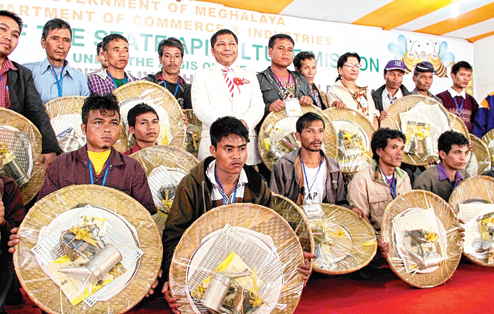 |
| Meghalaya chief minister Mukul Sangma with bee keepers at the mission in Shillong on Thursday. Picture by UB Photos |
Shillong, Oct. 16: Meghalaya today formally launched its ambitious “apiculture mission” to intensify honey production by adopting technology for profitable marketing of honey and honey products through community engagement.
Apiculture is one of the missions under the Integrated Basin development and Livelihood Promotion Programme (IBDLP), which the state government believes can play a role in poverty reduction, employment generation and livelihood promotion.
Chief minister Mukul Sangma launched the mission, which is being promoted by the state commerce and industries department in partnership with the Meghalaya Institute of Entrepreneurship at the Polo ground.
The mission’s objectives include intensification of honey production in the state in terms of enhanced production and productivity, expanding the demand for honey in the emerging social matrix, motivating traditional beekeepers for adoption of modern and scientific beekeeping practices to increase honey productivity and motivate unemployed youth to take up beekeeping as a means of self-employment and sustainable economic source.
In the run-up to the formal launch, Agriculture Finance Corporation (AFC) India Ltd. was included as the strategic partner for building of apiculture clusters in Meghalaya.
The corporation, in co-ordination with the Meghalaya Institute of Entrepreneurship, had conducted a statewide scooping study on the status and potential of apiculture in Meghalaya.
The study revealed that though the state possesses a long tradition of beekeeping, the practice was still unscientific, which was more of a household than commercial activity characterised by low productivity and quality with little or no value addition. However, the study concluded that there was a tremendous scope for improvement of both productivity and quality of honey.
Delivering a speech at Polo ground today, Meghalaya commissioner and secretary P. Jain stated that the core beliefs of the mission is in synergy with that of the IBDLP programme where “each family must have at least three livelihoods”.
“Beekeeping has always been taken up more as a hobby than a livelihood. By training our local beekeepers behind the science of beekeeping, honey cultivation can become an enterprise that it can run in tandem with other sources of livelihoods,” Jain said.
He said the IBDLP programme would help each beekeeper with the seed capita, which would be handing over bee boxes to interested entrepreneurs. He cited the example of Williamnagar in East Garo Hills where construction of bee boxes has been specialised to the point that they are some of the best in the country.
Chief secretary Barkos Warjri asked beekeepers to dissuade people, especially farmers around them, to abstain from using pesticides in their fields as this was fatal for the bees.
In his address, the chief minister said the government’s objective was to create an environment where every family in the state will be capable of having earnings commensurate with the family’s needs to grow.
Stating that there has been “minimal success” of state and central initiatives over the years, and that their effects have just trickled down to the commoner or missed them altogether, Sangma said it was necessary to come up with initiatives on mission mode to reach out to more people.
He said honey was a product that needed to be invested in as it would provide beekeepers with a sustainable livelihood.
While speaking on the medical value of honey, he said this would be enough to motivate the government and entrepreneurs to invest in honey and make it “the best honey in the world”.
During the programme, the chief minister presented beekeeper kits to 21 master beekeepers of Khadarshnong village of East Khasi Hills.










